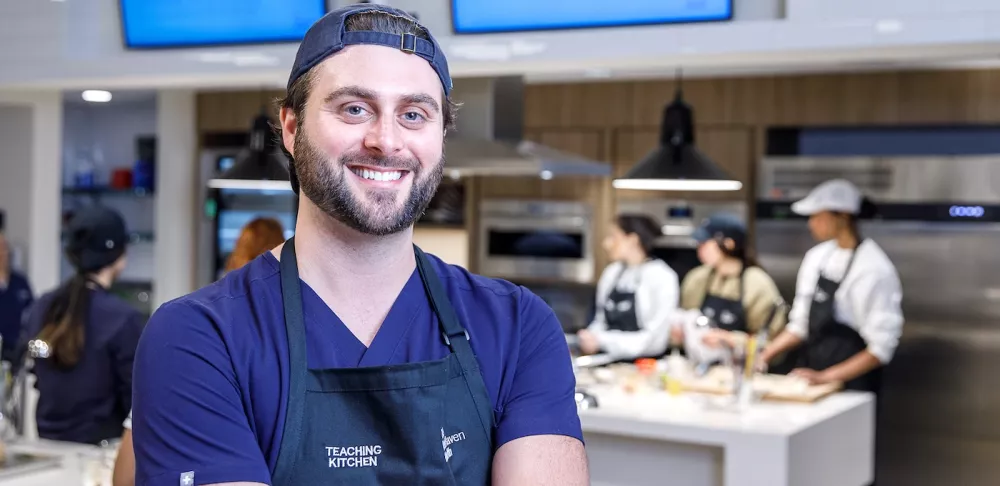"Yes, doctor" and "yes, chef" aren't necessarily two phrases one expects to hear in the same place. But, for ICE graduate Dr. Nate Wood, the combination of both worlds is just another day at work.
The foods we eat are central to our well-being, yet for many Americans, modern life makes it difficult to prioritize healthy eating. In a world where time is precious, some people view cooking as an expensive chore, which often equates to eating little or no fresh produce and nutrient-dense foods.
Though pharmaceuticals are available for diet-related heath ailments, Dr. Nate Wood, a graduate of the Institute of Culinary Education, takes a different approach.
As an Instructor of Medicine and the inaugural Director of Culinary Medicine at Yale School of Medicine and the Irving and Alice Brown Teaching Kitchen at Yale New Haven Health, Dr. Nate teaches patients and medical trainees the joy of cooking for health.
“It’s challenging to tell people to eat healthier without first helping them rediscover a love for good food that doesn’t break the bank,” Dr. Nate says. “In seeking out these nourishing and affordable foods, you’ll quickly learn to appreciate them. Then, everything else falls into place.”
Dr. Nate’s passion for food started early, with two grandfathers who worked as cooks — one in a hospital and the other in the army. Raised on meals that often featured healthy, home-grown ingredients, family cooking and baking became a bonding ritual in Dr. Nate's life.
But it wasn’t until a soccer injury left him laid up that he turned his focus to cooking. Watching the Food Network while recovering, Dr. Nate became fascinated with the art of food preparation, leading him to cook dinner for his family multiple times a week. Simultaneously, his time spent in the orthopedic surgeon’s office gave him a huge level of respect for physicians, ultimately pushing him towards the medical field.
After earning a degree in linguistics from the University of Michigan, Dr. Nate pursued a Doctorate of Medicine at Wayne State University. Three years into his studies, he solidified his desire to focus on “food as medicine” in his future practice but felt that he would first need to go to culinary school.
“I had medical knowledge, but I worried people would see me as just a doctor who likes to cook. I wanted more credibility to have a bigger impact, so I realized I needed formal training,” he says.
In 2018 Dr. Nate enrolled at ICE, taking a year off from medical school to immerse himself in the Culinary Arts program.
“Without culinary school, I wouldn’t have gained that foundational knowledge. My biggest takeaway was mastering sauces, which really distinguishes a trained chef from a home cook. I also loved learning about the regional cuisines of France and Italy,” he says.
Dr. Nate's dedication to culinary arts earned him ICE's prestigious Top Toque Award, which is given to the most outstanding student in each class. After graduating from ICE and completing an externship, he returned to Wayne State to finish his MD and later pursued a Master of Health Science at Yale. His goal was to combine his passions for food and health into culinary medicine—a growing field that uses interactive nutrition and cooking instruction to manage and prevent diseases.
“We need to focus more on how dietary choices contribute to diseases like heart disease, strokes, liver disease, obesity, cancer, and type 2 diabetes. Our diet directly impacts these conditions, which are leading causes of premature death in America,” Dr. Nate says.
Interested in health-focused culinary training? Check out Plant-Based Culinary Arts
As Director of Culinary Medicine, Dr. Nate oversees patient care, research, medical education, and community outreach at the Irving and Alice Brown Teaching Kitchen at Yale New Haven Health. His favorite part of the job is using hands-on culinary medicine education to help others learn to love food that is healthy, accessible, delicious, and fun to make.
“We teach culinary medicine to both patients and medical trainees in the teaching kitchen. One med student told me after a class, ‘This has been the best two hours of med school.’ An intern said it was their favorite part of the year,” Dr. Nate says. “Hearing that kind of feedback is incredibly rewarding, especially considering the long-standing perception that doctors aren’t taught much about nutrition.”
Dr. Nate continues to champion the integration of food into medical care, using his platform to go on TV and social media to show that healthy eating doesn’t have to be a chore — it can be enjoyable and life-changing.






